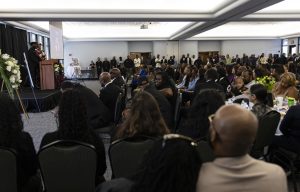New bill to halt campus hunts
March 13, 2008
California Assemblyman Cameron Smyth, R-Santa Clarita, introduced legislation in response to Sacramento State President Alexander Gonzalez’s endorsement of a hunting expedition for educational purposes in 2007.
Ryan Flanigan, legislative director to Smyth, said a couple of animals listed for the expedition endorsed by Gonzalez were endangered species.
The intent of Assembly Bill 2602 is to disable taxpayer-funded universities from using money to fund the hunting of endangered species, Flanigan said.
Flanigan said he hasn’t seen any other cases of university-endorsed hunting expeditions of endangered species.
The bill states the legislation would “prohibit a public institution of higher education from funding, facilitating or otherwise providing direct support for the lethal taking of any vertebrate animal by means of hunting or trapping.”
This legislation applies to all California public institutions of higher education including the University of California, California State University and California Community Colleges systems.
Sac State’s Public Affairs Office did not return phone messages for comment.
Nicholas Ewing, chair of the biological sciences department, recalled the department’s role in the series of events leading to Gonzalez’s endorsement.
He said several years ago, Marion O’Leary, dean of the College of Natural Sciences and Mathematics at the time, began discussion with Paul and Renee Snider regarding the possible donation of hunted animals that they had in their collection to Sac State.
The biological sciences department was asked if it had a need for the hunted animals or if there was a need for them to be placed on campus for display, Ewing said.
He said some people in the department were opposed to using hunted animals, while others had a positive outlook that if they were already killed, they might have educational value for the campus community.
Ewing said many of these specimens were from Africa, including lions and elephants, and the department decided it was not appropriate to hunt and kill those animals.
“The department statement at the time was that we thought it was of modest educational value,” Ewing said.
O’Leary asked Ewing to sign a letter requesting the Sniders to collect more animals on the department’s behalf in Africa. Signing the letter would support the Sniders being given permits to hunt animals.
Ewing said no list was included of the animals that were to be hunted.
He refused to sign the letter, stating the department would not support the hunting.
“In hindsight, I wish I had taken it to the department because at that point it would have come out more into the open … but in fact what he did was go directly to the president and ask the president to sign this (letter),” Ewing said.
Ewing said he didn’t request a list of the animals because he thought the issue would have ended by his refusal to sign the letter.
After Ewing refused to sign the letter, he heard the collection was again being considered.
Ewing said he contacted Gonzalez and re-conveyed that the department only felt the collection was of modest value and that he and many in the department were opposed to the collection.
“We wanted to caution him that there probably were many like us, that there were many others in the community who might also be strongly opposed to this. And that by him accepting this collection, we might be creating a situation in which many in the public would have a very negative opinion of this,” Ewing said.
He said the department did not know Gonzalez signed the letter and did not see the list until the Sacramento Bee released it. Ewing said the department would have in no way supported this.
“These were animals, some of which were actually endangered species, on the international red list for extinction,” Ewing said. “The university’s backing to this would have allowed them to hunt for animals that could not otherwise have been hunted through a normal hunting permit.”
Winston Lancaster, assistant professor in the biological sciences department, felt Gonzalez’s decision to support the hunting was poorly considered because it would and did cause opposition.
He said neither Gonzalez nor O’Leary sought advice from experts at Sac State regarding the request.
“It turned out to be a great embarrassment for the university. They didn’t even ask people who know about museum collecting,” Lancaster said.
Lancaster said professional museums collect specimens by sending people out who are professional biologists instead of using “big-game” hunters.
“Big-game hunting” is hunting animals for sport. Lancaster said the targets in this case were large African animals.University faculty and staff expressed the vagueness of the legislation’s current verbiage.
Lancaster said the current verbiage of the bill is enormously restrictive and doesn’t take into account any situation of legitimate science collection.
“For example, I would not even be allowed the way I read this here to trap rats,” Lancaster said. “It’s not giving really clear definitions about things. It doesn’t say if it makes an exception for legitimate scientific inquiry.”
Terry Manns, senior director of research administration, works as a liaison to the Animal Care and Use Committee.
The Animal Care and Use Committee policy reads: “The Committee’s charge is to review and approve all applications for University teaching and research animal use. The Committee shall inspect animal facilities, assist the animal user in establishing appropriate protocols and coordinate compliance with applicable regulations.”
Manns said students and professors submit protocols of research to the committee either for a master thesis or maybe instruction involving animals. He said the protocols are only submitted for observation instead of capture and release. He said there is no trapping of the animals.
Manns said the legislation is in its earliest stages and doesn’t appear that it would affect the university or departments. He said any new bill might be amended or changed during the review.
Manns said the final version would have to be looked at to determine if it would affect the university.
Bruce Behrman, chair of the psychology department, said the department uses animals for research, but does not hunt or trap the animals.
He said the Sutter Institute for Medical Research, an institute that inspects the department’s use of animals a couple of times per year, has always given the department high remarks for its treatment of animals.
Behrman said the only group on campus that may be affected by the legislation is the biology department because of its museum holdings. However, he said the department has specific policies on the specimens.
He said there is a distinction between the university using animals for scientific purposes and receiving a gift from sport hunting.
Dudley Burton, chair of the environmental studies department, said various people might trap or hunt animals for purposes of scientific study.
He said the Sniders wanted to do sport hunting and give the specimens to the university to validate or justify what they were doing.
This did not fit with the biology department’s policy on how specimens would be collected, Burton said.
“Permits to faculty, staff and students allow for the acquisition of specimens of birds and mammals through salvage only. Separate special permits must be legally obtained for research which may include salvage, capture/release or (rarely) sacrifice of the animal,” the Department of Biological Sciences Museums Code of Ethics and Collections Policy states.
Lancaster said besides the department’s policy, federal laws are currently in place to prevent anyone within the U.S. from harming endangered species.
He said the U.S. Endangered Species Act prohibits anyone from directly harming or impacting the habitat that may cause indirect harm to animals or plants declared endangered.
Individuals who want to collect animals for a California State University Museum, for example, must obtain a permit through the California Department of Fish and Game, Lancaster said.
Lancaster obtained a collection permit that allows him to pick up dead animals he finds to add to a collection.
If Lancaster wanted to trap animals, he said he’d have to obtain a different permit. He would have to present justification of the need for the animals, a clear scientific purpose for the taking of the animals, a list of the species he wants to obtain and certification that the species are not on the state or federal endangered species lists.
“It would be almost inconceivable that someone could be allowed to take an animal that was listed on an endangered species (list) through a state-collected permit,” Lancaster said. “This whole system is very strictly regulated.”
Paul Browning, media relations specialist at the CSU Public Affairs Office, said the CSU Chancellor’s Office does not have a position on the legislation because it’s too early in the bill’s life.
The California Legislature is scheduled to review the bill for the first time on or after March 25.
Ashley Downton can be reached at [email protected].























































































































